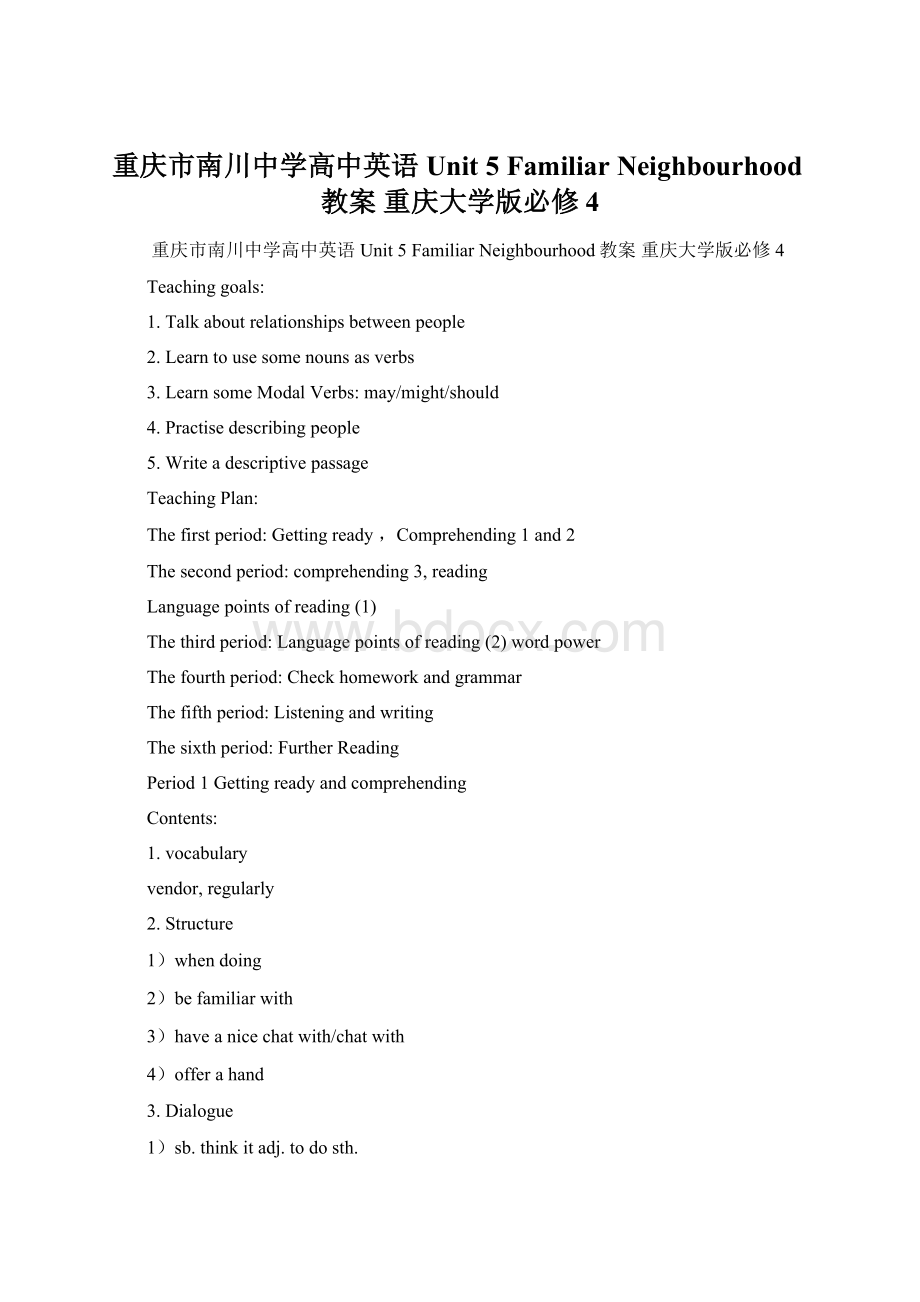重庆市南川中学高中英语 Unit 5 Familiar Neighbourhood教案 重庆大学版必修4.docx
《重庆市南川中学高中英语 Unit 5 Familiar Neighbourhood教案 重庆大学版必修4.docx》由会员分享,可在线阅读,更多相关《重庆市南川中学高中英语 Unit 5 Familiar Neighbourhood教案 重庆大学版必修4.docx(19页珍藏版)》请在冰豆网上搜索。

重庆市南川中学高中英语Unit5FamiliarNeighbourhood教案重庆大学版必修4
重庆市南川中学高中英语Unit5FamiliarNeighbourhood教案重庆大学版必修4
Teachinggoals:
1.Talkaboutrelationshipsbetweenpeople
2.Learntousesomenounsasverbs
3.LearnsomeModalVerbs:
may/might/should
4.Practisedescribingpeople
5.Writeadescriptivepassage
TeachingPlan:
Thefirstperiod:
Gettingready,Comprehending1and2
Thesecondperiod:
comprehending3,reading
Languagepointsofreading
(1)
Thethirdperiod:
Languagepointsofreading
(2)wordpower
Thefourthperiod:
Checkhomeworkandgrammar
Thefifthperiod:
Listeningandwriting
Thesixthperiod:
FurtherReading
Period1Gettingreadyandcomprehending
Contents:
1.vocabulary
vendor,regularly
2.Structure
1)whendoing
2)befamiliarwith
3)haveanicechatwith/chatwith
4)offerahand
3.Dialogue
1)sb.thinkitadj.todosth.
2)askwhereshelives
Objectives:
1.Instructionalobjectives
languageknowle
dgeandlanguageskills
1)askwhereshelives
2)befamiliarwith
3)haveanicechatwith/chatwith
4)offerahand
5)sb.thinksitadj.todosth.
2.Educationalobjectives
1)affect:
Howtogreetstrangers,trainthewaysofcommunicating
2)learningstrategy:
questionanswering
3)culturalawareness:
differencebetweenneighborsofChineseandneibourso
fforeigners
3.Personalobjectives:
becomemoresociable
Focalpoints
Howtoguidethestudentstogettoknowtheirneighbors
Somelanguagepoints
1)sb.thinksitadj.todosth.
2)askwhereshelives
DifficultPoint:
Howtodescribepeoplecorrectly
ProceduresandTimeAllotment
Stage1Greetingstudentsreadyforlearning
Stage2Revision
Stage3Pre-stage
Step1Vocabularypresentationandpractice
vendorn.小商贩
regularlyadv.固定地,定期地
regularadj.固定的,定期的
adj.+ly=adv.
Eg.wonderful,wonderfully;careful,carefully
Step2Structurepresentationandpractice
1.sb.thinksitadj.todosth.
我们认为学英语有趣
WethinkitinterestingtostudyEnglish.
4.askwhereshelives
注意宾语从句后的陈述名语序
Tellmewhatyournameis.
Nobodyknowswhenitisgoingtorain.
5.offerahand
=giveahand
Whenmyfriendisintrouble,Ialwaysoffer/giveahand.
当我朋友有困难的时候,我总是出手相助。
6.whendoing
当when后的动作与主语是同一个人发出时,可以省略主语和谓语动词be
Sayhellotoyourteacherswhenmeetingthem.
看到老师请问好
Ste
p3Prediction
somefamiliarexpressionsmightbeforgotten
Stage4while–stagestudents’bookpage65
(Developingdifferentskillsthroughtasks)
1Fillinthechartwithwhatyouknow
Checkstudents’answersbyaskingsomeonetoanswertheminpublic
2Choosethereason,askingthestudentstomakeupmorereasonsiftheycan’tfindtherightanswers.
3tickthewaystogreetstranger
Supplement:
howtotalktoastranger
Gettoknow
7.Relax
Stage5Post-stage
Step1Oralwork
Greetastrangeraround
Step2Writtenwork
Describesomepeopleyoumeeteveryday
Stage6Lookthroughreadingandfinishcomprehending1,2page67
Stage7Assigninghomework
Talkaboutyourneighborsaroundyouandgettoknowanewpersonandwritedownhowtoknowhim.
Period2Reading
(1)andcomprehending
Contents:
1.Vocabulary:
somehow,boot,scarf,sunglasses,jog,sense,belonging,unusual,encounter,jogger,marker,unnamed
accustom-accustomed,neat-neatly,wool-woolen,regular-regularly
2.Structure
1)managetodosth.
managenottodosth.
2)beaccustomedto
3)senseofplaceandbelonging
3Dialogue
1)Somehowwemanagenottoseeituntilwhateveritiswe’vebecomeaccustomedtosuddenlydisappears.
2)ItwasthenIrealizedhowIexpectedtoseehereachmorning.
Objectives:
1.Instructionalaims(languageknowledgeandlanguageskills)
状语从句,强调句
2.Educationalaims
1)effect:
developthereadingskills
2)learningstrategy:
scanningandskimmings
3)culturalawareness:
Ourlifeconsistsofencounterswithfamiliarstrangers
3Personalobjectives
Developthecommunicatingskillswithstrangers
Difficultpoints:
Understandeachpartofthepassage.
ProceduresandTimeAllotment
Stage1Gettingstudentsreadyforlearning
Step1Greetings
Step2Routinetask
Stage2Revision
Stage3Pres-stage
1.Vocabularyofreading
somehow,boot,scarf,sunglasses,sense,belonging,unusual,
encounter,marker,unnamed,jog-jogger-jogging,accustom-accustomed,neat-neatly,wool-woolen
2Finishcomprehending3onpage68
Workingroupstodiscussquestions,collecttheanswersofstudentsandlearntheirinnerworldwhichwillbenefitthemoraleducation.
Stage4While-stage
1managetodosth.成功地做某事
managenottodosth.
succeedindoingsth.
登山队员们成功地攀上了珠峰。
Themountain–climberssucceededinreachingthetopofEverest.
Themountain-climbersmanagedtoreachthetopofEverest.
工人们设法做到了没有破坏森林。
Theworkersmanagednottodestroytheforests
2beaccustomedto
每个人都习惯了自己的居住地。
Everybodyisaccustomedtohislivingplaces.
3nomatterwhat
无论发生什么,我都会支持你。
Nomatterwhathappens,Iamalwaysonyourside.
=Whateverhappens,Iamalwaysonyourside.
状语从句时可以互换,主语从句只能用whatever
(延伸)nomatter+疑问词,疑问词+ever
4consistof=bemadeupof
中国是由五十六个民族组成。
Chinaconsistsof56groups.
=Chinaismadeupof56groups.
5encountern.v.
在街上遇见了我的老同学。
Iencountermyformerclassmateinthestreet
那是我第一次与她相遇。
It’smyfirstencounterwithher.
encounterdifficulties遭遇困难
6senseofplaceandbelonging方位感和归属感
thesenseofbeauty美感
thesenseofdirection方向感
makesense有意义,有道,
makesenseof了解
cometoone’ssense苏醒
havenosenseofshame无羞耻心
inallsenses在各方面
innosense决不是
insomesense在某种意义上
loseone’ssense昏过去
outofone’srightsense失常
Stage5Post-stage
1Oralwork:
readaloudthetext
2Writtenwork
Makesentenceswiththelanguagepoints
Stage6Assigninghomework
1conclusion
2homework:
languagefocus
Period3Reading
(2)Wordpower
Contents:
Languagepoints
1)bydoingsth.
2)Whyshouldwenotmarkwherewearewhenwepassafamiliar,thoughunnamed,person?
3)stopdoing
4)greetsb.
5)seeingthefamiliarstranger,Iamhomeatlast
6)Iwasstandinginacoffeeshopwhenawomansaidhello
7)seesb.Walking
Vocabulary:
1.Somewordscanbeusedasbothnounsandverbs
chat,walkdress,mark,flood,welcome
2.Structure
1)seesb.walking
3)stopdoing
4)greetsb.
3.Dialogues
1)Whyshouldwenotmarkwherewearewhenwepassafamiliar,thoughunnamed,person?
插入语
2)Seeingthefamiliarstranger,Iamhomeatlast.
Objectives:
1.Instructionalaims(languageknowledgeandlanguageskills)
状语从句,强调句
2.Educationalaims
1)Affect:
Developthereadingskills
2)learningstrategy:
Collectinformationandapplythem
3)Culturalawareness:
Seeingthefamiliarstranger,Iamhomeatlast.
3.Personalobjectives
Developthecommunicatingskillswithstrangers
Focalpoints
状语从句,强调句
Difficultpoints:
Understandeachpartofthepassage.
Thedifferencebetweenseesb.doing/stopdoing/doing,
ProceduresandTimeAllotment
Stage1Gettingstudentsreadyforlearning
Step1Gree
tings
Step2Routinetask
Stage2Revision
Stage3Pre-stage
WordpowerStudents’bookpage68
Findthewordsorphrasesinthearticlewhichmeanthefollowing.
Stage4While-stage
1)bydoingsth.Ving.作介词宾语
Theymakealivingbyselling
newspaper.
他们靠卖旧报纸为生。
2)Whyshouldwenotmarkwherewearewhenwepassafamiliar,thoughunnamed,person?
thoughunnamed,为插入语,相当于thoughheisunamed
3)stopdoingsth.停止做某事/soptodosth.停下来做某事
rememberdoingsth.记得做了某事/remembertodosth.记得去做某事
forgetdoingsth.忘记做了某事/forgettodosth.忘记去做某事
trydoingsth.试着做某事/trytodosth.努力去做某事
meandoingsth.意味着做某事meantodosth.打算去做某事
4)greetsb.=sayhellotosb.
5)Iwasstandinginacoffeeshopwhenawomansaidhello
When这时,突然
Iwasabouttoleavewhenthebellrang.
我正要离开这时铃响了。
6)seesb.walking
Ving作宾语补足语
hearsb.doing,
watchsb.doing
比较;seesb.do/seesb.doing
Wesawamangoingintothecave.
我们看见一个人进了这个洞。
(已经完成)
Wesawhimdancingontheplayground.
我们看见他在操场上跳舞。
(正在发生)
7)Seeingthefamiliarstranger,Iamhomeatlast
Ving.作原因状语
Beingill,hedidn’tgotoschool.
生病了,他没去学校。
Havingbeenpraisedtoomuch,hebecameproud.
经常被表扬,他就骄傲起来了。
Stage5Post-stage
Ving.
seesb.doing/stopdoing/doing,
Wordpower
P68.2Completethefollowingwiththeproperformofwordsorphrases
3Makesentencesorally
4wordsusedbothasverbs.andnouns.
e.g.Watertheflowers,please.v.
It’sgoodtodrinkalotofwatereveryday.n.
Stage6Assigninghomework
Makesentenceswithwordsandphraseslearnedinclass.
Period4Grammar-modalverbsmay/might/should
Contents:
1.Structure
Itmayraintomorrow,butIhopeitwillbesunny.
Itmightraintomorrow,buttherearenocloudsintheskytoday.
2.DialogueorReading
Should/shouldn’t
Objectives:
1.Instructionalobjectives
May/might,should
2.Educationalobjectives
1)affect:
choosetherightmodalverbstoshowrightintention
2)learningstrategy:
grammar
3)culturalawareness:
permission,possibility
3.Personalobjectives:
Rightwaysofusingmodalverbs.
Focalpoints
Thedifferencebetweenmayandmight
Perfecttensewithmodalverbs.
DifficultPoint:
Howtochoosearightmodalverb
ProceduresandTimeAllotment
Stage1Greetingstudentsreadyforlearning
Step1Greetings
Step2Routinetask
Stage2Revision
1情态动词的语法特征
1)情态动词不能表示正在发生或已经发生的事情,只表示期待或估计某事的发生。
2)情态动词除ought和have外,后面只能接不带to的
不定式。
3)情态动词没有人称,数的变化,即情态动词第三人称单数不加-s。
4)情态动词没有非谓语形式,即没有不定式,分词,等形式。
Stage3Presentation
情态动词
例1:
----Therewerealreadyfivepeopleinthecarbuttheymanagedtotakemeaswell.
----It______acomfortablejourney.
A.can’tbeB.shouldn’tbe
C.mustn’thavebeenD.couldn’thavebeen
例2:
----IstayedatahotelwhileinBeijing
----Oh,didyou?
You______withBarra.
A.couldhavestayedB.couldstay